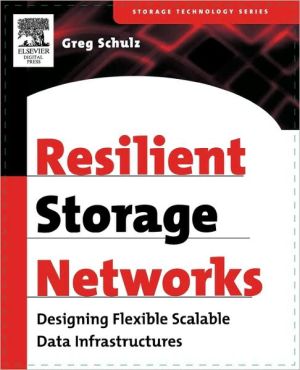Resilient Storage Networks: Designing Flexible Scalable Data Infrastructures
A resilient storage network is an environment where data is always available for the needs of the business. This book explains the components, as well as how to design and implement a resilient storage network for workgroup, departmental, and enterprise environments. Storage networks are an enabling capability combining technology and best practices to provide the foundation to support information technology systems and applications. Storage networks can be of various sizes, shapes, and...
Search in google:
DIGITAL PRESS STORAGE TECHNOLOGY SERIESCONSULTING EDITORS: Jerry Cochran and Howard GoldsteinThe Storage Technology Series from Digital Press provides computer professionals with the latest information on this topic. Our editorial board includes storage experts Jerry Cochran of Microsoft Corporation and Howard Goldstein of HGAI, a consulting firm based in Colorado. "Greg Schulz has written the most authoritative and definitive book on storage networking. It is must reading for anyone considering procurement of storage or currently has a network and requires storage that will be accessible across the network. His insights on configuring and managing storage make this a truly invaluable reference for not only those entering the storage arena but also for seasoned storage managers."—Peter Doob-Storage Professional"A few years ago, Greg Schulz contributed to a book on enterprise resiliency for which I was the editor. I observed at the time that he had such a wealth of material on storage network resiliency that a whole book on that subject would make sense. Now, he's done it. "Resilient Storage Networks" is the most thorough exposition of the subject I've seen to date. It includes material on justification, technology, implementation, management, and concludes with examples of storage networks optimized for particular purposes or situations. As an independent analyst with an extensive background in both the storage and network industry segments, Greg is uniquely qualified to speak on this subject. Enterprise storage architects, designers, and managers, as well as executives will find "Resilient Storage Networks" both interesting and informative." —Paul Massiglia-Author & Technical Director, Veritas Software"Resilient Storage Networking” is the most complete picture I have seen of this complex and business relevant area of technology. It objectively presents the issues and possible solutions so the reader can make decisions appropriate to their business and technology needs with a clear understanding of the implications of those decisions. It is an excellent choice for the unexercised as an education tool and for the very experienced as a reference source."— Greg Brunton-EDS Australia"Greg’s vast knowledge, his clear concise writing style and excellent use of diagrams, makes it easy to comprehend the complex topics of storage networking." —Tom Becchetti-Blue Cross Blue Shield KEY FEATURES:*Important information is clarified and put into context to separate myths and realities *Covers storage networking technologies (hardware, software, networks) and practices*Numerous tips and recommendations allow the reader to quickly understand best practices*Checklists, templates and examples show potential solutionsA resilient storage network is an environment where data is always available for the needs of the business. This book explains the components, as well as how to design and implement a resilient storage network for workgroup, departmental, and enterprise environments. Storage networks are an enabling capability combining technology and best practices to provide the foundation to support information technology systems and applications. Storage networks can be of various sizes, shapes, and technologies. This book shows you how to implement a resilient storage network infrastructure using different technologies including ATM, DWDM, FCIP, Fibre Channel, FICON, iFCP, InfiniBand, IP, iSCSI, Life Cycle Management, NAS, Object Based Storage, RAID, RDMA, Remote Mirroring, Replication, SAN, SCSI, SMI-S, SONET/SDH, Storage Services, Tape, Virtualization, and Volume Managers.
ForewordPrefaceAcknowledgmentsPt. IWhy build resilient networks?1Importance of information52Data storage fundamentals19Pt. IINetworking with your storage3Networking with your storage354Storage and I/O networks695Fiber-optic essentials1056Metropolitan and wide area storage networks1257Storage networking devices151Pt. IIIResilient storage networks8Storage network design1899Storage networking topologies22310Performance and capacity planning for storage networks24911Storage management28312Protecting data31313Securing storage and storage networks329Pt. IVPutting it all together14Small storage networking examples35315Consolidation and intermix examples36316Metropolitan and wide area storage networking examples37717Large and high-performance examples38718Wrap-up397App. A: Useful web sites407App. BResilient storage networking checklist415App. CGlossary of storage networking terminology421Index425About the author443
\ From the Publisher"Greg Schulz has written the most authoritative and definitive book on storage networking. It is must reading..." -- Peter Doob – Storage Professional\ "'Resilient Storage Networks' is the most thorough exposition of the subject I've seen to date." --Paul Massiglia – Author & Technical Director, Veritas Software\ "[This book] is an excellent choice for the unexercised as an education tool and for the very experienced as a reference source." -- Greg Brunton – EDS Australia\ "Greg’s vast knowledge, his clear concise writing style and excellent use of diagrams, makes it easy to comprehend the complex topics of storage networking."\ --Tom Becchetti – Blue Cross Blue Shield\ "Schultz’s book is an excellent primer for network administrators who need a concise yet thorough entry into the field of storage, and should be a must-have on any storage administrator’s library shelf." – Storage Networks Industry Association, April 2006\ \ \ \








